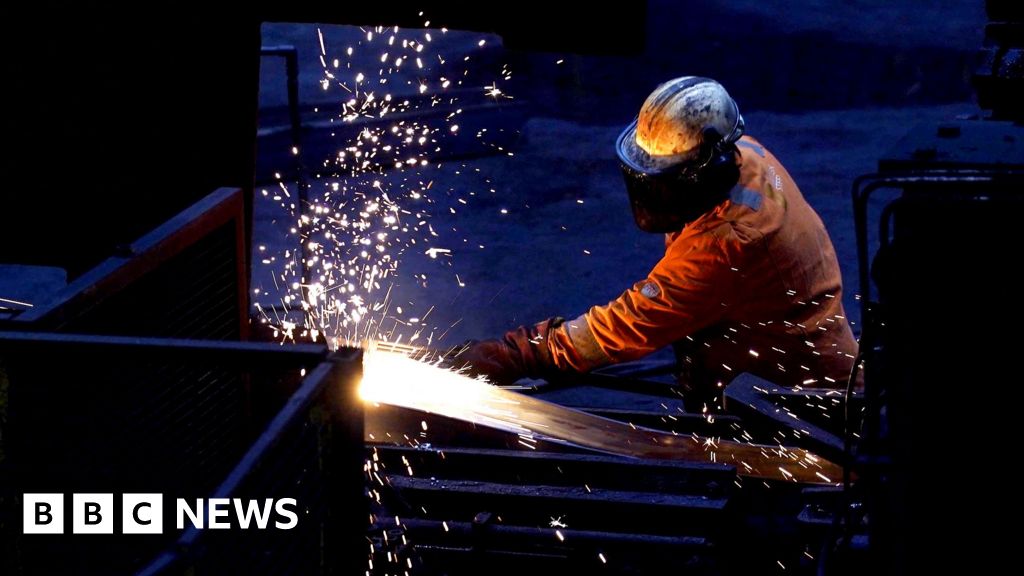British Steel has secured a five-year contract worth £500m to supply train tracks for Network Rail. The company will forge more than 337,000 tonnes of track in a deal safeguarding the short-term future of the Scunthorpe steelworks. It comes after the government seized control of the company from its Chinese-owner Jingye in April amid accusations it was planning to switch the blast furnaces off, which would have made them permanently unusable. British Steel said the new contract represented a "huge vote of confidence in UK workers and British industry". While British Steel has long supplied the track used for Britain's railways with Scunthorpe producing rail since 1865, the latest deal provides guaranteed work for the plant for at least the next five years. The contract will begin on 1 July, with the company continuing to provide Network Rail with 80% of its track needs and other European steelmakers to supply "specialist rail products" alongside, the government said. Clive Berrington, Network Rail's director for railway business services, said the public company, which owns and maintains Britain's railways, was "committed to buying British where it makes economic sense to do so". "British Steel remain extremely competitive in the provision of rail and will remain our main supplier in the years ahead," he added. Craig Harvey, commercial director for rail at British Steel added the agreement demonstrated the firm's "importance to the UK's economy and infrastructure". In April, the government took control of British Steel from its owners but has so far stopped short of fully nationalising the business. It has not ruled out full public ownership, but is also looking for potential private investors to fund steelmaking operations, which has increasingly been raised as a national security issue. Concerns over the future of the UK's steelmaking capability were raised when talks between the government and Jingye broke down, with the business secretary saying it had "become clear" that the company was intent on closing down the blast furnaces. If the furnaces were starved of fuel and went out, the UK would no longer have the ability to produce so-called virgin steel, due to the process of restarting them being extremely difficult and costly. Virgin steel-making involves iron being extracted from its original source to be purified and treated to make all types of steel used in major construction projects, such as new railways. Scunthorpe, which employs 2,700 people, is the last plant in the UK producing virgin steel. It has four blast furnaces, all named after English Queens - Bess, Mary, Anne and Victoria, but Bess and Anne are the only two still in operation. The government said the new deal with Network Rail demonstrated its progress to "strengthen domestic manufacturing and supply chains" in order to boost economic growth. Transport Secretary Heidi Alexander, who is set to visit Scunthorpe on Tuesday, said the contract "truly transforms the outlook for British Steel". The deal comes ahead of the government's national infrastructure strategy being released later this week. Uncertainty has surrounded the future of the UK's steel industry in recent years, with the closure of Port Talbot's blast furnaces in 2024. US tariffs targeting imports of steel to the country have also threatened businesses. The UK has been temporarily spared from President Donald Trump'sexecutive order doubling steel tariffs from 25% to 50%. However, the UK could end up facing the higher rate if its deal signed with the Trump administration last month, which would see steel and aluminium tariffs axed, does not come into force.
British Steel secures £500m contract to supply UK train tracks
TruthLens AI Suggested Headline:
"British Steel Wins £500 Million Contract to Supply Train Tracks to Network Rail"
TruthLens AI Summary
British Steel has successfully secured a significant five-year contract valued at £500 million to supply train tracks for Network Rail, marking a crucial milestone for the company and the UK steel industry. This contract entails the production of over 337,000 tonnes of track, ensuring the operational stability of the Scunthorpe steelworks, which has been a vital part of British steel manufacturing since 1865. The agreement follows a tumultuous period for British Steel, which saw the UK government take control of the company from its Chinese owner, Jingye, amid concerns over the potential shutdown of critical blast furnaces. The new contract, set to commence on July 1, will see British Steel providing 80% of Network Rail's track requirements while also partnering with other European steelmakers for specialized rail products. Network Rail's director for railway business services, Clive Berrington, emphasized the importance of supporting local industry, stating that British Steel remains a competitive and vital supplier for the future of the UK's rail infrastructure.
The contract not only secures jobs at the Scunthorpe plant, which employs around 2,700 people, but also highlights the government's commitment to bolstering domestic manufacturing and supply chains as part of a broader economic strategy. The agreement comes at a time when the future of the UK's steel industry is under scrutiny, particularly with the impending closure of Port Talbot's blast furnaces and the threat of increased tariffs on steel imports from the United States. The UK government is actively exploring options to maintain steel production capabilities, considering both private investment and the possibility of full nationalization. Transport Secretary Heidi Alexander, who plans to visit Scunthorpe, remarked that the contract significantly improves the outlook for British Steel, illustrating a step towards strengthening the UK's industrial base and ensuring the continued production of virgin steel, a critical resource for major infrastructure projects.
TruthLens AI Analysis
You need to be a member to generate the AI analysis for this article.
Log In to Generate AnalysisNot a member yet? Register for free.
